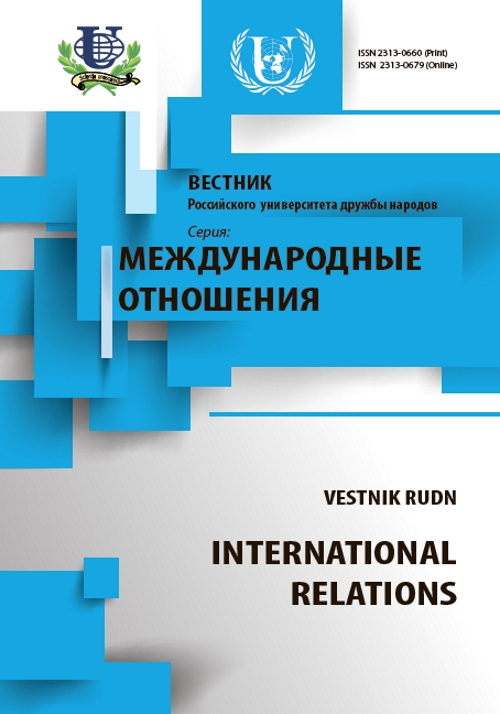Unilateral US Withdrawal from the ABM Treaty of 1972 and its Global Consequences
- Authors: Butorov A.S.1
-
Affiliations:
- Peoples’ friendship university of Russia
- Issue: Vol 16, No 1 (2016): "Soft Power" in International Relations. The Image of Russia
- Pages: 153-164
- Section: Articles
- URL: https://journals.rudn.ru/international-relations/article/view/10537
Cite item
Full Text
Abstract
The author analyzes the origins and reasons for the termination of the US operations of the Soviet-American ABM Treaty in 1972 based on a study in the Archives of the Russian Federation's foreign policy documents, as well as the US Congress materials, traced the evolutionary path of unilateral withdrawal from the American side agreements. The article notes that for three decades was carried out in relation to the Soviet-American agreements on limiting missile defense systems in 1972 a policy of double standards. Declaring in words their commitment to the fundamental principles of the treaty, in practice, the United States all these years set the stage for a unilateral withdrawal from the contract. Particularly emphasized that the denunciation of Washington in 2001 ABM Treaty is the cornerstone of strategic stability and security in the world, it became the starting point for the deployment of the US global missile defense system.
About the authors
Alexey Sergeevich Butorov
Peoples’ friendship university of Russia
Author for correspondence.
Email: lex1989@yandex.ru
Department of theory and history of international relations
References
- Arbatov A.G. Protivoraketnaja oborona i novye strategicheskie otnoshenija Rossii I SShA. [Missile defense and the new strategic relationship between Russia and the United States ] Moscow: RGB, 2004.
- Belous V.S. Protivoraketnaja oborona i oruzhie XXI veka. [Missile defense and weapons of the XXI century] Moscow: Veche, 2002.
- Kozin V.P. Evoljucija protivoraketnoj oborony SShA I pozicija Rossii (1945-2013 gg.). [The evolution of the US and Russian missile defense position (1945-2013)] Moscow: Ross. in-t str. issled. 2013.
- Matveev O.V. Istorija i razvitie vojsk raketno-kosmicheskoj oborony: Protivoraketnaja oborona kak factor nacional'noj bezopasnosti. [The history and development of the forces of rocket-space defense: Missile defense as a national security factor.] Moscow: Min-vooborony RF, 2002.
- Pervov M. Sistemy raketno-kosmicheskoj oborony sozdavalis' tak. [Systems missile and space defense were created in this way.] Moscow: Aviarus-XXI, 2003.
- Rogov S.M. i dr. Desjat' let bez dogovora po PRO: Problema protivoraketnoj oborony v rossijsko-amerikanskih otnoshenijah. [Ten years without an agreement on missile defense: missile defense problem in Russian-American relations.] Moscow: Speckniga, 2012.
- Tishhenko G.G. Sozdanie system protivoraketnoj oborony zarubezhom I bezopasnost' Rossii [Creation of missile defense systems abroad and the security of Russia.] Moscow: Ross. in-tstrat. issled. 2005, 414 p.
- Gromyko A.A. Pamjatnoe. Kn. 2. [Memorable] Moscow: Politizdat, 1988.
- Dobrynin A. Sugubo doveritel'no. Posol v Vashingtone pri shesti prezidentah SShA (1962-1986) 2-e izd. [Strictly confidential. Ambassador in Washington with six US presidents (1962-1986 biennium)] Moscow, Mezhdunarodnye otnoshenija, 2008.
- Kissinger G.A. The White House Years. London, Weidenfeld&Nicolson&Joseph, 1979.
- Podgoretz N. The Present Danger: «Do We Have the Will to Reverse the Decline of American Power?» N.Y.: Simon & Schuster Publ, 1980.
- Luttwak E. The Pentagon and the Art of War.The Question of Military Reform. Simon&Schuster Publ., 1984.
- Tucker R. Political Culture and Leadership in Soviet Russia. N.Y.: W.W. Norton & Company, 1987.
- Laqueur W. Looking Back. A Decade of World Politics. N.Y.; Praeger, 1983.
- Podgoretz N.«The Rise of Neoconservatism». The Virginia Quarterly Review, Spring 1996.











